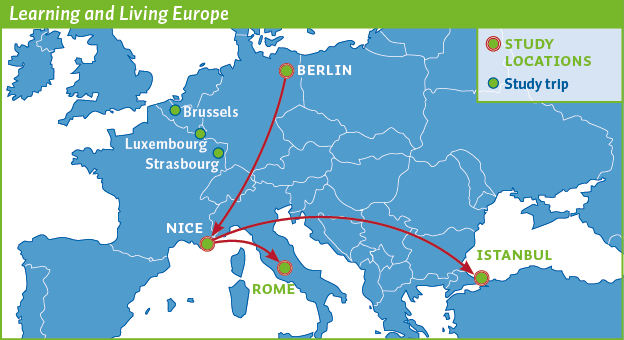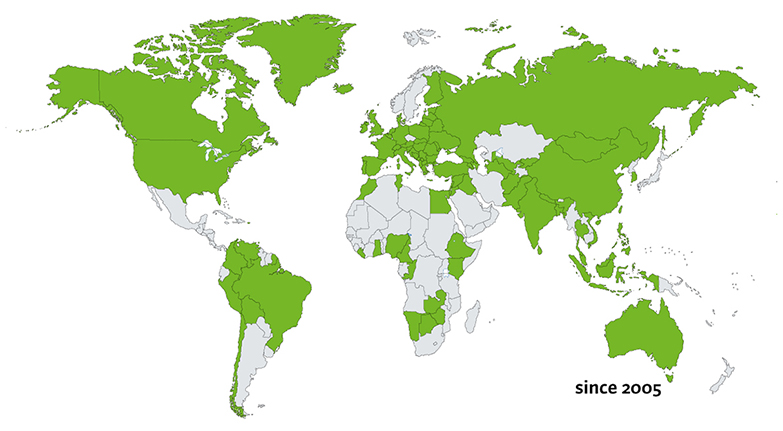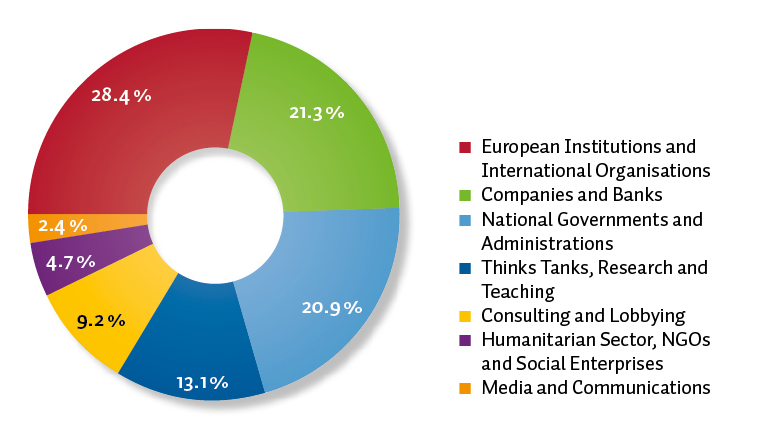|
The Master in Advanced European and International Studies (MAEIS) -
European Integration and Global Studies
 Duration: 1 year (October to June) Duration: 1 year (October to June)
 Study Locations: Berlin (Term 1), Nice (Term 2), Rome or Istanbul (Term 3) + Study Trip to the European Institutions in Brussels, Luxembourg and Strasbourg Study Locations: Berlin (Term 1), Nice (Term 2), Rome or Istanbul (Term 3) + Study Trip to the European Institutions in Brussels, Luxembourg and Strasbourg
 Language: English Language: English
 Credits: 60 ECTS (or 90 ECTS with internship option) Credits: 60 ECTS (or 90 ECTS with internship option)
 Partners: European Stability Initiative, Berlin ; Luiss School of Government, Rome ; Istanbul Bilgi University, Istanbul Partners: European Stability Initiative, Berlin ; Luiss School of Government, Rome ; Istanbul Bilgi University, Istanbul
 Internship Option: 3 to 6 months to be completed by 31 December Internship Option: 3 to 6 months to be completed by 31 December
 Application Deadline: 30 April 2026 Application Deadline: 30 April 2026
 Tuition Fees: €9,800 Tuition Fees: €9,800
 Early Bird (€8,900): 31 January 2026 Early Bird (€8,900): 31 January 2026
Why Choose CIFE?
 Learn from academics and practitioners, including high-ranking national and EU institutional representatives. Learn from academics and practitioners, including high-ranking national and EU institutional representatives.
 Gain insights from peers representing over 30 countries. Gain insights from peers representing over 30 countries.
 Join a worldwide network of over 5,000 CIFE Alumni. Join a worldwide network of over 5,000 CIFE Alumni.
 We're one of the seven "designated institutions" supported by the European Union. We're one of the seven "designated institutions" supported by the European Union.
 95% of our graduates attest full satisfaction with the programme. 95% of our graduates attest full satisfaction with the programme.

Learning and Living Europe
Our Master in Advanced European and International Studies - European Integration and Global Studies is designed for highly motivated students who seek to become the next generation of European decision-makers. Students move their place of study from Berlin to Nice, and then to either Rome or Istanbul, depending on their choice.
Graduates receive two certifications: the Master in Advanced European and International Studies - European Integration and Global Studies; and the degree qualification "Policy Officer in European and International Organisations" (level 7 EQF), recognised by the French state.
Programme Structure
Our curriculum is regularly updated to reflect the current global geopolitical, social and economic landscape.
Please note that the information given below may be subject to change.
Read more about the teaching modules here.
|
|
Study Trip to the European Institutions
One of the best ways to learn about European and international organisations is to visit them. That is why a study trip to Brussels, Luxembourg and Strasbourg is an essential part of the programme. The students meet with public officials who explain the mission of their institution and aspects of their work. These visits enable the students to gain an insight into the working environment of European and international organisations, to make useful contacts and to learn about recruitment procedures.
Among recent visits:
 Brussels: Council of the European Union, European Commission, European External Action Service Brussels: Council of the European Union, European Commission, European External Action Service
 Luxembourg: Court of Justice of the European Union, European Investment Bank Luxembourg: Court of Justice of the European Union, European Investment Bank
 Strasbourg: European Parliament (including a plenary session), Council of Europe, European Court of Human Rights Strasbourg: European Parliament (including a plenary session), Council of Europe, European Court of Human Rights
Who Studies the Master in Global Studies?

Where Our Graduates Work

What Our Alumni Are Saying
|
Admission Requirements
We seek motivated candidates who wish to deepen their understanding of the role of the European Union in an ever more complex world.
As an international and interdisciplinary programme, this Master is open to candidates of all nationalities and academic backgrounds.
 Bachelor's degree Bachelor's degree
 A good knowledge of English (minimum C1). Level should be obtained by the start of the academic year. A good knowledge of English (minimum C1). Level should be obtained by the start of the academic year.
 Application Deadline: 30 April 2026 Application Deadline: 30 April 2026
Click for more information on how to apply
Fees and Funding
We strive to make our programme accessible to exceptional candidates through various financial options.
 Tuition Fees: €9,800 Tuition Fees: €9,800
 Early Bird Discount: €8,900 for applications received before 31 January 2026 Early Bird Discount: €8,900 for applications received before 31 January 2026
 Scholarships: Available based on merit and need Scholarships: Available based on merit and need
 Tuition covers academic teaching, accommodation in Berlin, programme-related travel expenses and the study trip to Brussels, Luxembourg and Strasbourg. Tuition covers academic teaching, accommodation in Berlin, programme-related travel expenses and the study trip to Brussels, Luxembourg and Strasbourg.
Click for more information about fees and funding
|
|
About CIFE
CIFE European Institute has been at the forefront of European education since 1954. We are committed to fostering European integration and cooperation.
Under the presidency of Herman Van Rompuy, former President of the European Council, we continue to innovate in EU studies. Our offices in Nice, Berlin, Brussels and Istanbul ensure an international perspective, preparing you for the complex world of EU affairs.
|
Join the next generation of European decision-makers!
|
|
|